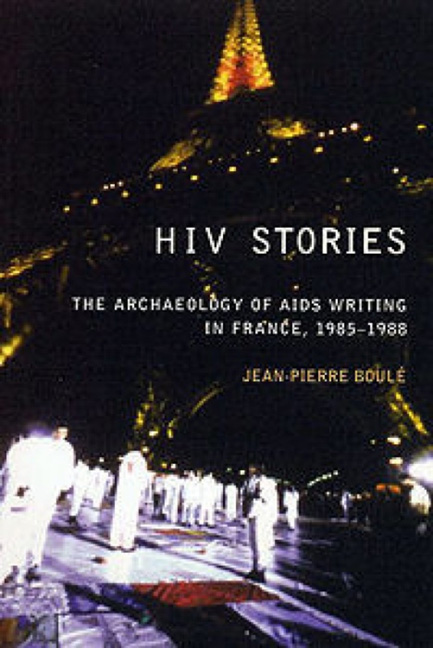4 - Testimony, Self-Avowal and Confession
from Part II - AIDS Testimony
Summary
This chapter brings together two instances of AIDS writing as testimonial. My reading will concentrate on the autobiographical nature of these texts but this approach is not meant to undermine the testimonial ‘spirit’ which was emerging in France as early as 1986. These testimonies were a political gesture intended to perform a particular political act through a particular statement, which then becomes more than personal. But this writing had to ‘assert’ itself against the AIDS fiction which, as I showed in Part I, mirrored the social attitudes of the time. This testimonial writing offers a contrast with the exploitative narratives of the fiction and with the kinds of views and attitudes represented by it. Testimonial authenticity is the opposite of exploitative narratives, with their conventional plots and stereotypes. As products of the popular culture industry, the latter are part of the problem that testimonial is up against. Simonin and Aron (and later Dreuilhe) are trying to express what it is like to live as an HIV-positive person. Testimonial writing is not only personally therapeutic but also an attempt to diagnose the social pathologies that are responsible for the embattlement of AIDS subjects, pathologies which are so embedded in society that they are not recognised as pathologies. Because of this context, testimonial writing runs a high risk of failing in its enterprise: speaking into the blind spots of society there is the danger of remaining invisible, unseen, unheard. This could explain why there is a fine line between testimony, self-avowal and confession. Simonin's book is constructed as self-avowal, and a narrative of guilty confession is superimposed on Aron.
Simonin: The Forgotten Witness
Neither in L’Épidémie. Carnets d'un sociologue, Les Écrivains sacrifiés des années sida nor Le Rose et le noir is there any mention of Michel Simonin or of his book Danger de vie. The book is out of print and its author is a forgotten witness. As the publisher has been taken over there is no possibility of consulting the press-cutting file, and I am told that there is no trace of this author in the old catalogues. Did Michel Simonin and his book really exist? Not for Paillard, anyway: he writes that Dreuilhe was the first French-speaking author to have broken the silence on the subject of AIDS, whereas Dreuilhe's book was published a year after Simonin's.
- Type
- Chapter
- Information
- HIV StoriesThe Archaeology of AIDS Writing in France, 1985–1988, pp. 89 - 119Publisher: Liverpool University PressPrint publication year: 2002



